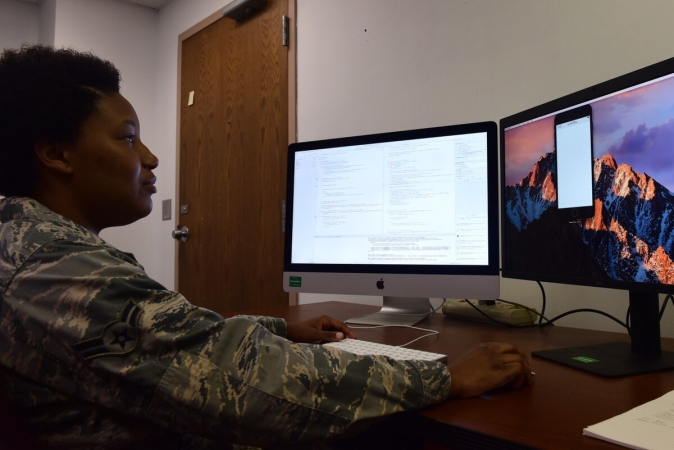1 décembre 2020
How the Biden administration is expected to approach tech research and development
Andrew Eversden WASHINGTON — Experts expect President-elect Joe Biden's administration to build on the Trump administration's investments in emerging technologies, while adding to research and development budgets in the Defense Department and across the federal government. The incoming Biden administration signaled throughout the campaign that basic research and development funding would be a priority. Biden wrote in Foreign Affairs he would make research and development a “cornerstone” of his presidency and pointed to the United States having the “greatest research universities in the world.” “It's basic research that's the area where you get the breakthroughs, and you need long-term, sustained investments to build up a strong S&T base,” said Martijn Rasser, a senior fellow at the Center for a New American Security's technology and national security program. Biden's R&D investment is an expected change from the Trump administration's approach, which experts have noted is narrower in scope and focused on harnessing private sector innovation. “The reality is the U.S. private sector has eclipsed the government, which in some ways that can be good,” said Rep. Jim Langevin, D-R.I., chairman of the House Armed Services Committee's Subcommittee on Intelligence and Emerging Threats and Capabilities. “The private sector can move with greater agility than the government, but the private sector may not be focusing on developing those exquisite technologies that we need for the war fighter.” Experts told C4ISRNET they expect the Biden administration to invest more money in basic research areas and to reform immigration laws that slowed the innovation pipeline from abroad to the United States. “China is closing in. They are spending every year more and more on R&D. They will soon, if not already, be spending as much as we are, if not more on R&D,” Langevin said told C4ISRNET. “Congress has woken up to this problem.” Basic research Perhaps the most likely area the Biden administration is poised to change is basic research and development funding. According to annual reports from the Congressional Research Service, the Trump administration consistently proposed top-line cuts to federal research and development in yearly budget proposals. This included the fiscal 2021 budget proposal's $13.8 billion decrease in defense R&D over the fiscal 2020 funding enacted by Congress. While the Pentagon has often been spared from such cuts, the Trump administration has also suggested trimming the defense-related basic research budget line — money that is a “substantial source of federal funds for university R&D,” according to the Congressional Research Service. The White House's FY21 defense-related basic research budget line asked for a reduction of about 11 percent from FY20 enacted, or a $284.2 million decrease. Biden's campaign platform calls for a four-year investment of $300 billion in R&D for new technology such as 5G, artificial intelligence, advanced materials and electric cars. “A nation speaks to and identifies its priorities by where it puts its research dollars, where it puts its money,” Langevin said. “Basic research has to be more of a priority, and that's something I'm going to encourage the Biden administration to focus on.” Michèle Flournoy, thought to be a leading contender to become the next secretary of defense, has also written about the need to increase investment in emerging technologies to counter China. In Foreign Affairs in June, Flournoy wrote that “resilient battlefield networks, artificial intelligence to support faster decision-making, fleets of unmanned systems, and hypersonic and long-range precision missiles” will “ultimately determine military success.” “Continuing to underinvest in these emerging capabilities will ultimately have dire costs for U.S. deterrence,” she wrote. Congressional and think tank reports published during the Trump administration's tenure called for an increase in basic research funding. A report from the House Permanent Select Committee on Intelligence's strategic tech and advanced research subpanel, led by Rep. Jim Himes, D-Conn., recommended bumping up federal research and development funding from 0.7 percent to 1.1 percent of gross domestic product, or an increase of $146 billion to $230 billion. A report by the Council on Foreign Relations from 2019 applauded the Trump administration's requested increases in funding for the Defense Advanced Research Projects Agency, now funded at $3.46 billion, and the Defense Innovation Unit, for which the Trump administration requested $164 million. Laying the groundwork Initiatives started under the Trump administration did provide a groundwork on which the Biden administration can build. Under the Trump administration, DARPA kicked off a $1.5 billion microelectronics effort. In artificial intelligence, the administration launched the American AI Initiative. However, the Council on Foreign Relations criticized that effort because it had no funding and left agencies to prioritize artificial intelligence R&D spending without metrics, while also drawing funds from other research areas. The administration also made an $1.2 billion investment in quantum information science. “The Trump administration started bringing national attention and federal focus to many of these technologies,” said Lindsey Sheppard, a fellow at the Center for Strategic and International Studies. “I hope to see from the Biden administration perhaps a more cohesive guiding strategy for all of these pieces.” While the Trump administration has started many initiatives, the Council on Foreign Relations report also criticized the Trump administration's innovation strategy as an “incremental and limited approach,” writing that “action does not match the language officials use to describe the importance of AI to U.S. economic and national security.” While investment in future technology is important, defense budgets are expected to stay flat or decrease in the coming years. In her Foreign Affairs article, Flournoy acknowledge that the budgetary reality will require “tough tradeoffs.” Experts agree. “R&D programs are going to have to start being able to consistently, clearly articulate justifications for their budgets and the returns on investment,” Sheppard said. But the coronavirus pandemic has highlighted the need for increased investments in research and development, Himes and Langevin argued. Both lawmakers identified biothreats as something they fear for the future. Biological threats are one area that DARPA — an organization Langevin pointed to as a major federal R&D success story — has triumphantly address. Commercial partners from DARPA's 3-year-old pandemic prevention platform program announced they developed a COVID-19 therapeutic using new techniques. “There's absolutely going to be a rethink,” Himes told C4ISRNET in an interview. “Are we correctly allocating money between the possibility that there could be a pandemic that kills a million Americans, versus the possibility that we're going to have to fight the Russians in the Fulda Gap? I think there's going be a lot of thinking about that. And there should be thinking about that because our money should go to those areas where there's the highest probability of dead Americans.” Immigration innovation Another way to improve American innovation in critical future technologies is by allowing highly skilled foreigners to work in the United States. Biden has hinted at changes that will affect American innovation through the expected reversals of President Donald Trump's immigration policies, which limited high-skilled workers from legally working in the country. The Biden administration's platform states it wants to reform the H-1B visa process that the Trump administration restricted, much to the chagrin of American tech companies, which use the program to hire top talent from abroad. Think tanks have recommended reforming the current U.S. immigration policy to attract international students, entrepreneurs and high-skilled workers because of the innovative ideas they provide. For example, an analysis by Georgetown University's Center for Security and Technology found that 68 percent of the United States' top 50 artificial intelligence companies were co-founded by immigrants, most of whom came the U.S. as students. “A lot of the Trump administration's policies — we're shooting ourselves in the foot making it so much harder for people to come here,” said Rasser, who wrote a report for CNAS last year calling for H1-B caps to be increased. “Because of the fact that people want to come to the United States to live and work, that's one of our greatest competitive advantages. It's something I expect the Biden administration to reverse.” https://www.c4isrnet.com/smr/transition/2020/11/29/how-the-biden-administration-is-expected-to-approach-tech-research-and-development/



